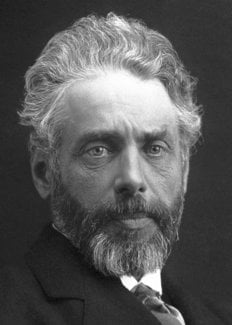Henrik Pontoppidan
Biographical

My father, Dines Pontoppidan, belonged to an old family of clergymen and was himself a minister. My mother, whose maiden name was Oxenbøl, was the daughter of a government official. They had sixteen children. One of the middle ones in the flock, I was born on July 24, 1857, in the small Jutland town of Fredericia. In 1863, my father was transferred to Randers, another Jutland town, where a year later, at the age of six, I experienced the invasion of the allied Prussian and Austrian armies. When I was seventeen I went to Copenhagen, where I was accepted at the Polytechnical College. After a summer trip to Switzerland, which was rich in experiences, I started writing. In the beginning I aimed at descriptions of nature and folk life until, as the years passed, the description of man became my chief interest.
My first book was published in 1881. I began with a few volumes of smaller tales, among which was Fra hytterne (1887) [From the Cottages]. But the subjects which especially attracted me demanded a more spacious form and a broader style. I turned to the novel, an artistic form which had in former days been neglected and had thus acquired a bad reputation, but which during the nineteenth century had developed and elevated itself to the ranks occupied by drama and the ancient epic. In a trilogy, Det forjaettede land (1891-95) [The Promised Land], Lykke-Per (1898-1904) [Lucky Peter], and De dødes rige (1912-16) [The Kingdom of the Dead], I have attempted to give a continuous picture of the Denmark of today through descriptions of human minds and human fates which reflect the social, religious, and political struggles of the time. Aside from this, over the years I have produced a number of minor and more personal works, wherein imagination has been allowed to play more freely. I mention Ung elskov (1885) [Young Love], Minder (1893) [Memoirs], Den gamle Adam (1894) [The Old Adam], Højsang (1896) [Song of Songs], Borgmester Hoeck og hustru (1905) [Mayor Hoeck and Wife], Den kongelige gaest (1908) [The Royal Guest], and Hans Kvast og Melusine (1907) [Hans Kvast and Melusine]. My collected works comprise approximately forty volumes.
Biographical note on Henrik Pontoppidan
Henrik Pontoppidan (1857-1943) wrote his last novel, Mands himmerig [Man’s Heaven], in 1927. The most significant work of his later years consisted of five volumes of memoirs, published between 1933 and 1943.
Henrik Pontoppidan died on August 21, 1943.
This autobiography/biography was written at the time of the award and first published in the book series Les Prix Nobel. It was later edited and republished in Nobel Lectures. To cite this document, always state the source as shown above.
The Nobel Foundation's copyright has expired.Nobel Prizes and laureates
Six prizes were awarded for achievements that have conferred the greatest benefit to humankind. The 14 laureates' work and discoveries range from quantum tunnelling to promoting democratic rights.
See them all presented here.
